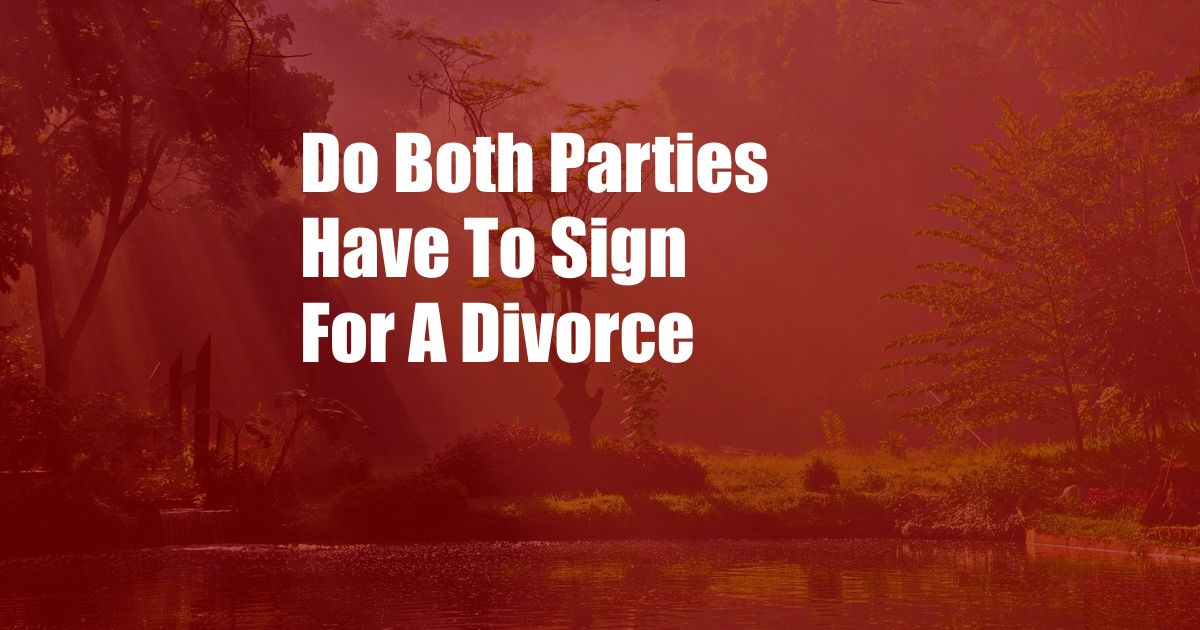
Do Both Parties Have to Sign for a Divorce?
In 2018, I found myself sitting in a lawyer’s office, nervously awaiting the finalization of my divorce. I had been married for ten years, and it had been a painful process to come to the decision to end the relationship. Amidst the paperwork and legal jargon, one question lingered in my mind: did both parties have to sign for a divorce?
The answer, as I discovered, was not as straightforward as I had assumed. In most cases, only one spouse needs to initiate the divorce process. However, there are certain circumstances where the signature of both parties may be required. Understanding these nuances is crucial for anyone contemplating or going through a divorce.
Uncontested vs. Contested Divorce
The type of divorce you file will determine whether both parties need to sign for it. An uncontested divorce occurs when both spouses agree on all aspects of the divorce, including the division of assets, child custody, and support. In such cases, only one spouse needs to file the petition for divorce. The other spouse then responds by signing an acknowledgment that they have been served with the petition and agree to the terms of the divorce.
However, in a contested divorce, one or both spouses do not agree on one or more aspects of the divorce. In these situations, both parties must sign a settlement agreement or a court order before the divorce can be finalized. The settlement agreement outlines the terms of the divorce, including the division of assets, child custody, and support. If the parties cannot reach an agreement, the court will make a decision on these matters.
Understanding the Process
The process of filing for divorce can vary depending on the state in which you reside. In most cases, the process begins with one spouse filing a petition for divorce. The petition must include specific information, such as the grounds for the divorce and the requested relief. The other spouse is then served with the petition and must respond by filing an answer. If the divorce is uncontested, the parties can file a joint petition for divorce, which must be signed by both spouses.
If the divorce is contested, the parties will need to negotiate a settlement agreement or go through a trial process. During the trial, the judge will hear evidence from both parties and make decisions on the outstanding issues. Once a settlement agreement is reached or a court order is issued, both parties must sign the document.
Tips and Expert Advice
Navigating the divorce process can be a challenging and emotional experience. Here are some tips and expert advice to help you navigate this difficult time:
- Seek legal counsel: An experienced divorce lawyer can guide you through the legal process and ensure that your rights are protected.
- Be prepared to compromise: Divorce often involves difficult decisions. Be willing to compromise on certain issues to reach an amicable settlement.
- Prioritize the well-being of your children: If you have children, their well-being should be your top priority throughout the divorce process.
- Seek emotional support: Divorce can take an emotional toll. Connect with friends, family, or a therapist for support.
Remember that you are not alone in this process. By seeking professional guidance and support, you can navigate the divorce journey with resilience and emerge from it with a brighter future.
Frequently Asked Questions (FAQ)
Q: Do both parties have to sign for a divorce in all cases?
A: No, in most cases, only one spouse needs to initiate the divorce process. However, in a contested divorce, both parties must sign a settlement agreement or a court order.
Q: What is a no-fault divorce?
A: A no-fault divorce allows one spouse to file for divorce without assigning blame to the other spouse.
Q: What are the grounds for divorce?
A: The grounds for divorce vary by state. Common grounds include adultery, abandonment, and irreconcilable differences.
Q: How long does a divorce take?
A: The length of a divorce depends on the complexity of the case and the jurisdiction. Uncontested divorces can be finalized in a few months, while contested divorces can take years.
Conclusion
The question of whether both parties have to sign for a divorce depends on the type of divorce you file. In uncontested divorces, only one spouse needs to initiate the process. However, in contested divorces, both parties must agree to the terms of the divorce or a court order before it can be finalized. By understanding the process, seeking legal counsel, and prioritizing your well-being, you can navigate the divorce journey with resilience and emerge from it with a brighter future.
Would you like to know more about the divorce process and how it can affect you? Share your questions and comments below, and I’ll be happy to address them.